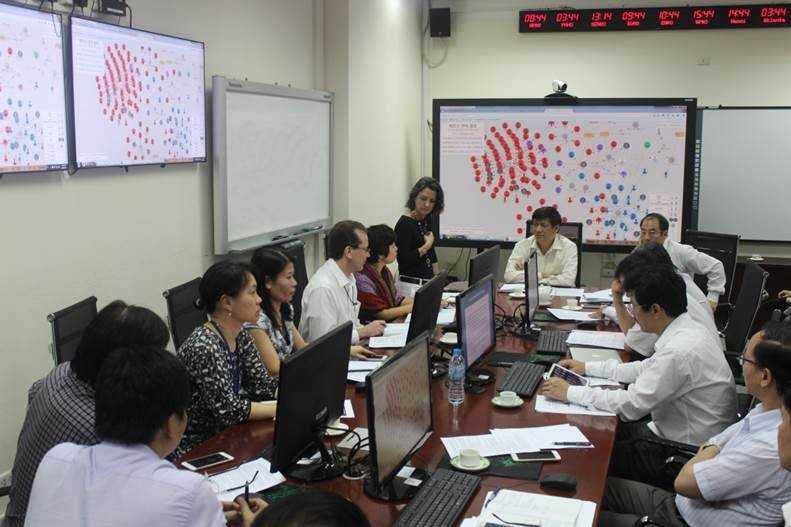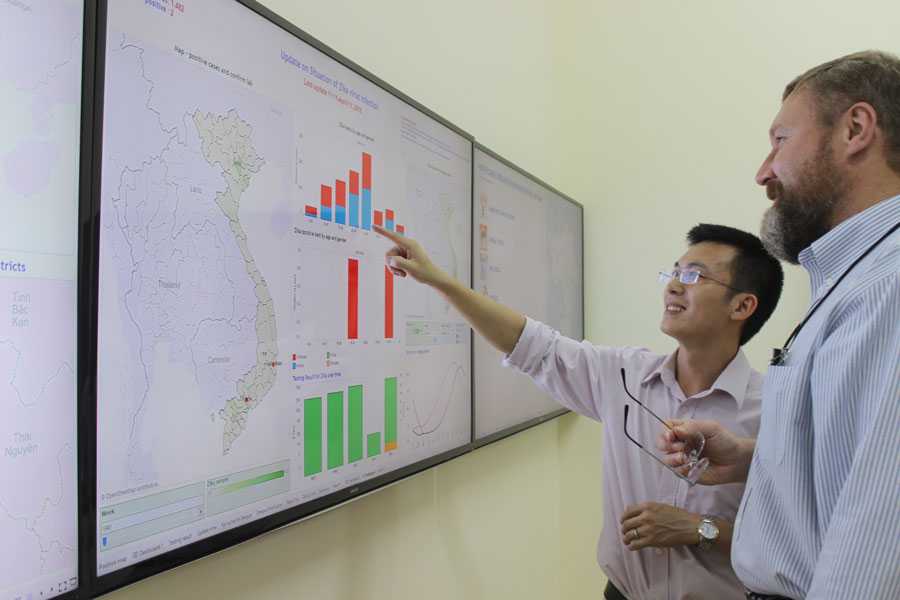Vietnam: Connecting for Stronger Emergency Response
Vietnam is creating a network of EOCs that will act as a nerve centers for epidemic intelligence, bringing outbreak detection and response even closer to the source.
Emergency operations centers are a cornerstone of emergency preparedness and response – a place where highly trained experts monitor information, prepare for known (and unknown) public health events, and gather in the event of an emergency to exchange information and make decisions quickly. Vietnam inaugurated its national EOC in February 2015.

Vietnam's national EOC was inaugurated in February 2015.
In a relatively short period, the national EOC has been activated for emergency preparedness during the Ebola outbreak in West Africa, the MERS-CoV outbreak in South Korea, and the Zika outbreak in South America and Vietnam. While the national EOC is the first step to strengthening national emergency response, Vietnam aims to do more.
Connected and ready
Vietnam’s geographic landscape is vast and varied, from mountainous remote regions with temperate climates in the north bordering China and Laos to tropical climates in the south. This means the risks of disease outbreaks vary significantly by region.
To counter these challenges, Vietnam is creating a national network of EOCs to act as nerve centers for epidemic intelligence. In addition to the national EOC, four regional EOCs will provide fast and accurate information when outbreaks emerge. Vietnam’s health system is decentralized, with public health authorities delegated to regional institutes and provinces. Regional EOCs will communicate and share data directly with the national EOC, between the four regions of Vietnam, and with international partners.
Highly trained experts
The right people are key to an effective response. The new EOC network will be run by skilled personnel, including staff trained through CDC’s Field Epidemiology Training Program (FETP), a two-year program that trains disease detectives in the field. The network of EOCs will also link to rapid response teams who can investigate and contain public health threats. Staff will participate in regular trainings and simulations to build knowledge and prepare for coordinated responses to outbreaks.

A photo of the data dashboard with Dr. Tran and Peter Rzeszotarski, CDC Emergency Management Specialist.
Dr. Tu Anh Tran is one of the lead FETP fellows on the scene. To help manage information, Dr. Tran designed a data visualization dashboard for the EOC network. “The dashboard will help decision-makers better understand disease outbreaks and decide when and how to best deploy resources for emergency response.”
A responsibility to the world
Vietnam takes protecting the world’s health seriously, going the extra mile to meet commitments to the Global Health Security Agenda and the International Health Regulations.
“They say ‘it takes a village to raise a child,’” says U.S. Ambassador to Vietnam Ted Osius. “It will take many nations working together to secure the health and future of all of our children. The vitality of Vietnam’s economy is only as secure as the collective health of our people, and that is why Global Health Security is so important. Global health security means safer nations and more stable economies.”
About this Story
This story illustrates Vietnam’s commitment to implementing the Global Health Security Agenda (GHSA), which aims to improve the world’s ability to prevent, detect, and respond to infectious disease threats. Vietnam was one of the first 30 countries to commit to the GHSA. They are a co-lead (with Indonesia) on the Zoonotic Diseases action package and a contributing country to the Emergency Operations Centers action package.
Vietnam’s recent investments will help them meet the GHSA Emergency Operations Centers targets, including having trained EOC staff capable of activating a coordinated emergency response within 120 minutes of the identification of a public health emergency.
The country continues to work closely with local and international organizations to accelerate progress towards the GHSA, such as WHO, U.S. Government agencies (HHS/CDC, USAID, DoD, DoS, and USDA), and PATH.
Today, CDC is partnering with 31 countries around the world, including Vietnam, to reach the goals of the GHSA.
Related Links
- Page last reviewed: May 17, 2016
- Page last updated: May 17, 2016
- Content source:
Global Health
Notice: Linking to a non-federal site does not constitute an endorsement by HHS, CDC or any of its employees of the sponsors or the information and products presented on the site.


 ShareCompartir
ShareCompartir